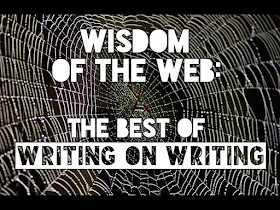Today I want to share some of what I'm calling the Wisdom of the Web. There are many wonderful writing blogs out there with wonderfully helpful content. Today I'd like to share three blog posts I thought contained excellent advice.
1. The 5 Most Common Mistakes Writers Make When Seeking Book Reviews, by Gisela Hausmann.
This is from C.S. Lakin over at Live, Write, Thrive.
Top Amazon reviewer Gisela Hausmann gives advice on how to approach a reviewer with a request to review your book. This is a daunting task since top Amazon reviewers receive more than 200 requests per week!
According to Hausmann, here are a few mistakes to avoid:
- Make sure your request does not read like a form letter. You're a writer, let your distinct voice shine through. Think of your email more as an audition than as a solicitation.
- Focus on how your book is different from other books in your genre.
- Do your research. Discover what the reviewer likes to read. Study their Amazon Profile.
- Keep your email brief, 150 words or less.
- Be persistent. Don't give up! Just because a top reviewer doesn't agree to review your book right off the bat doesn't mean they're not interested in your work. They can only review so many books!
2. Five Tips For Creating Intrigue, nownovel.com.
Here are a few tips on how to keep readers reading:
- Begin in the middle of the action.
- Tell each chapter from a different character's point of view.
- Vary the format of your novel. Try including letters, journal entries or emails.
- Have varied sub-plots. (e.g., tragedy vs comedy, etc.)
3. 25 Things I Want to Say to So-Called "Aspiring" Writers, by Chuck Wendig
a. Chuck Wendig says, Drop the 'aspiring' in 'aspiring writer.' If you write then, dang it all, you're a writer!
b. Writer's write. Don't aspire. Do!
c. Push through the bad days. Every writer has bad days. A professional writer shuts out the nagging voices of negativity and writes.
d. Develop your own voice. Some writers find it natural to write from a 1st person perspective, others prefer a 3rd person perspective. Some writers find it natural to write science fiction, others mystery stories. Some writers find it natural to write in past tense, others in present tense, and so on. The only way you'll know which kind of writer you are is if you plant your butt in a chair and write.
e. Finish what you write.
f. Learn the rules so you can break them.
g. Writing is a skill and like any skill—bricklaying for example—it can (and must!) be learned.
h. Read voraciously. Read critically.
i. Don't be discouraged when your work doesn't sell. If you keep at it you'll get better.
j. Talking about writing is not writing. Thinking about writing is not writing. Reading about writing is not writing.
k. Get used to rejection. Chuck Wendig writes, "You need a leathery carapace. A chitinous exoskeleton. Writing is a hard-knock career where you invite a bevy of slings and arrows into your face and heart. It is what it is." Amen.
l. Write! Chuck Wendig writes, "You’re a writer. You can make anything up that you want. It may not be lucrative. It may not pay your mortgage. But we’re not talking about that. We’re talking about what’s going on between you and the blank page before you. It’s just you and the story. If you love it and you want to write it, then wire your trap shut and write it. And write it well. Expect nothing beyond this — expect no reward, expect no victory parade — but embrace the satisfaction it gives you to do your thing."
Let me add my own point here:
m. Invest in yourself and use an editor. Most of us don't know a professional writer who can look over our work and give us feedback. The next best thing is enlisting the help of the best editor you can afford. But don't send your editor all 80,000 words of your first novel! Find an editor who will take a 10 page outline of your book along with the first chapter. That way, if you end up having to start over from scratch it's much less work for your editor and much less expensive for you. Most importantly, you'll save time. And in the end, time is our most valuable resource.
That's it! I hope you found something of use in these points. If you did, please let me know! If you didn't, please talk to me. Tell me what your goals are as well as what is keeping you from meeting those goals. You can use the comments, below, or email me (karenwoodwardmail (at) gmail (dot) com). I would love to hear from you!
Talk to you again on Friday. In the meantime, good writing!


No comments:
Post a Comment
Because of the number of bots leaving spam I had to prevent anonymous posting. My apologies. I do appreciate each and every comment.